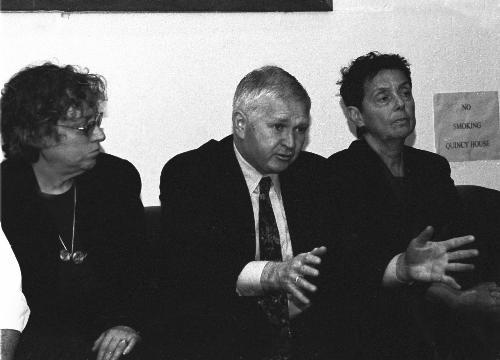
News
Summers Will Not Finish Semester of Teaching as Harvard Investigates Epstein Ties

News
Harvard College Students Report Favoring Divestment from Israel in HUA Survey

News
‘He Should Resign’: Harvard Undergrads Take Hard Line Against Summers Over Epstein Scandal

News
Harvard To Launch New Investigation Into Epstein’s Ties to Summers, Other University Affiliates

News
Harvard Students To Vote on Divestment From Israel in Inaugural HUA Election Survey
Councillors Urge Cooperation

Harvard students should take an active role in improving relations between the University and Cambridge, said four city officials at a forum sponsored by the Harvard College Democrats last night.
“For [Harvard’s] own backyard not to achieve its potential is a travesty,” said Cambridge Mayor Michael A. Sullivan.
But Sullivan, who founded the city’s University Relations Committee earlier this month, also distinguished between students and the University when evaluating the state of community relations.
“Students are different than the corporate being,” he said.
Members of the panel praised Harvard students for their level of activity in certain areas of the community.
“Harvard students do a lot in Cambridge, particularly around kids and education,” said State Rep. Alice K. Wolf (D-Cambridge).
Wolf, who served as an Institute of Politics fellow in 1994, said student-run community programs such as Citystep served as a source of goodwill between the city and the University.
City Council member Timothy J. Toomey Jr. said the tutoring he received in sixth, seventh and eighth grades from a Harvard student as part of a Phillips Brooks House Association program made a large difference in his education and perception of the University.
“Your interest in [local] politics is really great,” he told the crowd of about 25 students. “It was a great experience for a kid from East Cambridge to go to the cultural events at Harvard.”
But other panelists said students should also be concerned about issues other than social service when it comes to local politics.
“Development and planning issues around Harvard should be a central issue for students,” said councillor and former mayor Anthony D. Galluccio.
Panelists stressed the University’s attitude during negotiations with city officials, rather than specific issues, as an important factor in improving relations.
Galluccio said problems stem from “Harvard as a corporation not seeing itself as a partner in the community.”
Wolf, who commissioned a study during her time as Cambridge’s mayor to investigate city-University relations, stressed the need for action.
“[This] is a serious turning point in relations between the University and the city,” she said.
She mentioned other issues that have plagued relations.
Following the report released by the Harvard Committee on Employment and Contracting Policies this past December, Wolf said she wrote University President Lawrence H. Summers urging him to set aside a greater proportion of newly constructed Harvard housing for low-wage workers.
Panelists agreed the relationship between Harvard and Cambridge is reciprocal in nature, and urged students to do all they could to ensure that the University works to smooth relations.
“The students can change the tone [of the relationship],” Galluccio said. “Our bureaucracies are not necessarily as open to change as yours.”
Want to keep up with breaking news? Subscribe to our email newsletter.
